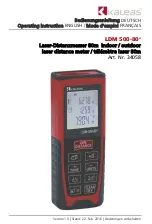
Detailed Installation Instructions
Quick Start Guide: SMS PVS5x
513403 Rev C
Copyright 2015 SunPower Corporation
Quick Start Guide:
SunPower Monitoring System
with PVS5x
Follow these instructions to install, configure,
and commission the PVS Supervisor 5x
(PVS5x) to start receiving monitoring data.
Installation and field service is to be performed only by qualified, trained personnel with the necessary skills and
knowledge to work on this type of electrical device. Field service is limited to the components contained in the
lower compartment of the PVS5x.
• Perform all electrical installations in accordance with any national and local codes, such as the National Electrical Code
(NEC) ANSI/NFPA 70.
• This enclosure is suitable for use indoors or outdoors (Type 3R)
.
Operating ambient from -30°C to 60°C.
• Before connecting power, the PPVS5x must be securely mounted to an inside or outside wall following the instructions in
this document.
•
For permanently connected equipment, a readily accessible disconnect device must be incorporated external to the
PVS5x.
• For electrical wiring code compliance, connect the PVS5x to a dedicated UL listed 15 A rated breaker using 14AWG wiring,
or a UL listed 20 A rated breaker using 12AWG wiring. The input operating current is less than 0.1 amp with AC nominal
voltages of 240 VAC (L1-L2).
• The PVS5x contains internal transient surge protection for connection to the load side of the service entrance AC service
panel (overvoltage category III). For installations in areas at risk of surges generated by high voltage utilities, industry or by
lightning, it is recommended that an external surge protective device also be installed.
• Do not attempt to repair the PVS5x. If the PVS5x fails, please return the unit to your distributor for servicing. Tampering
with or opening the upper compartment voids the product warranty.
•
For pluggable devices, the socket-outlet must be installed near the equipment and must be easily accessible.
Safety Instructions
This device complies with part 15 of the FCC Rules. Operation is subject to the following two conditions:
(1) This device may not cause harmful interference, and
(2) This device must accept any interference received, including interference that may cause undesired operation.
NOTE:
This equipment has been tested and found to comply with the limits for a Class B digital device, pursuant
to part 15 of the FCC Rules. These limits are designed to provide reasonable protection against harmful
interference in a residential installation. This equipment generates, uses and can radiate radio frequency energy
and, if not installed and used in accordance with the instructions, may cause harmful interference to radio
communications. However, there is no guarantee that interference will not occur in a particular installation. If
this equipment does cause harmful interference to radio or television reception, which can be determined by
turning the equipment off and on, the user is encouraged to try to correct the interference by one or more of the
following measures:
• Reorient or relocate the receiving antenna.
•
Increase the separation between the equipment and receiver.
•
Connect the equipment into an outlet on a circuit different from that to which the receiver is connected.
• Consult the dealer or an experienced radio/TV technician for help.
IMPORTANT NOTES:
Radiation Exposure Statement
This equipment complies with FCC RF radiation exposure limits set forth for an uncontrolled environment. This
equipment should be installed and operated with minimum distance 25 cm between the radiator and your body.
Caution
Changes or modifications not expressly approved by the party responsible for compliance could void the user’s
authority to operate the equipment.
This device and it’s antennas(s) must not be co-located or operating in conjunction with any other antenna or
transmitter except in accordance with FCC multi-transmitter product procedures.
FCC Compliance
• UL listed to UL60950-1 ITE and UL60950-22 for outdoor use.
• The PVS5x is not a utility meter, disconnect device, or power distribution device.
Safety Certification
Safety & Certifications
See the safety and installation manual
for complete instructions.
1. Mount the PVS5x
2. Wire the PVS5x Power
3. Connect Communications to PVS5x
4. Use the PVS Management App to Commission
1. Select an installation location that is not in direct sunlight.
2. Mount PVS5x bracket using appropriate hardware for the surface type that
supports 6.8 kg (15 lbs).
3. Fit PVS5x onto bracket until the pins fully engage the PVS5x holes.
4. Secure PVS5x to bracket using the two included M4 x 12 mm screws.
Warning!
Do not power up the system until after you complete Step 2 and Step 3 and are ready to configure the PVS5x.
1. Ensure that the circuit breaker is OFF.
2. Prepare the PVS5x for AC wiring:
• Remove the PVS5x enclosure cover by loosening three screws on the bottom of the enclosure.
• Remove the top AC wiring cover.
• Remove the bottom AC wiring cover.
• Flip the AC wiring partition to the opposite side of where your AC wiring will be incoming.
AC WIRING COVERS
TOP
BOTTOM
ENCLOSURE COVER
AC WIRING PARTITION
3. Run power conduit from the service panel to the PVS5x.
Note.
The PVS5x is preconfigured with openings for 3/4” conduit. You can use 1/2” conduit with supplied reducing
washers and gaskets. If you use the rear conduit entrances, seal the holes on the bottom of the enclosure with the
included hole plugs.
4. For electrical wiring code compliance and optimal communications, connect the PVS5x to a dedicated UL listed 15 A
rated dual-pole breaker using 14AWG wiring, or a UL listed 20 A rated dual-pole breaker using 12AWG wiring. When
using AC modules, this breaker should be in the same service panel containing the 20 A dual-pole breakers for the
modules.
5. Strip wires and land the black wire to
L1
, the red wire to
L2
, the white wire to
N
, and the green wire to
GND
in the
PVS5x terminals.
6. Run CT wires for consumption monitoring from the service panel, through the power conduit, and land one set of CT
wires in
CONS L1
and the second set in
CONS L2
. Verify that the CT
phases are consistent with the AC wiring phases.
7. (Optional) If installing production monitoring with solid core
production CT: run CT wires from the service panel, through the power
conduit, and land this set of CT wires in
PROD
.
8. Replace the bottom AC wiring cover.
9. Replace the top AC wiring cover over the AC power wires (on the left
if you ran through left hole, on the right if you ran through the right
hole).
S
unPower recommends connecting PVS5x
directly
to the customer’s router with an Ethernet cable.
1.
Run communication conduit to the PVS5x conduit opening. The PVS5x is preconfigured with 3/4” conduit openings. You can use
1/2” conduit with supplied reducing washers and gaskets. Seal all unused holes with the included Type 4 hole plugs.
Important!
Do not run communication cables through same opening or conduit as power wire.
2. Connect to homeowner’s Internet using Ethernet cable, Power Line Ethernet Adapter, or their Wi-Fi network.
3. To connect communication for each device. Follow the
Quick Start Guide: SunPower Monitoring System PVS5x Devices
for complete instructions.
• AC modules
: You should have already connected AC modules
to the service panel. The PVS5x communicates with AC modules
using PLC protocol.
• SMA, ABB:
Connect the cable with a blue connector from the PVS5x
RS-485 2-WIRE
communications port (blue) and land wires in the
only, or first, inverter in the daisy-chain.
• Meter:
Connect the cable with a green connector from the PVS5x
RS-485
2/4-WIRE
port (green) to the (optional)
external meter communication terminals.
4. Replace the PVS5x enclosure cover and tighten three srews on bottom of enclosure.
1.
Turn laptop Wi-Fi off.
2. Connect an Ethernet cable from laptop to PVS5x
LAN1
port.
3. Open a browser and type:
www.sunpowerconsole.com
.
4.
Follow the instructions to set up communication, check firmware, discover devices, verify device operation, and
commission the site.
L1
GND
L2
N
W
B
W
B
W
B
CONS L1 CONS L2 PROD
D-AUX
RS-485
2-Wire
LAN1
RS-485
2/4-Wire
WAN/
LAN2
SMA/ABB/METER/
OTHER (2-W)
INSTALLER
COMPUTER
FRONIUS (4-W)/
METER/OTHER
HOMEOWNER
ROUTER




















